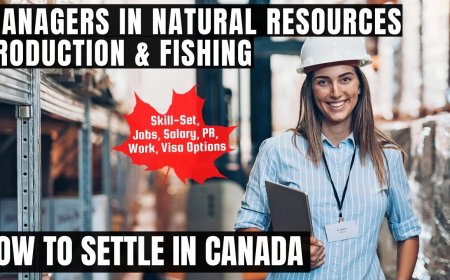Oil and gas well drilling and related workers and services operators Opportunities in Canada: A Comprehensive Immigration, Salary, and Duties Guide
Welcome to the pathway to Canada immigration for skilled professionals and trade workers. This guide is specifically tailored for Oil and gas well drilling and related workers and services operators looking to work and settle in Canada, offering a deep dive into the essential aspects of immigration and employment in this field.
Introduction
Canada’s oil and gas industry plays a crucial role in the country’s economy, providing numerous job opportunities for skilled workers in various occupations. One such occupation is that of Oil and gas well drilling and related workers and services operators, classified under NOC Code 8412. In this article, we will delve into the profile description, main job duties, education and licence requirements, skills required, median age and retirements, salary details, and possible visa options for those interested in pursuing a career in this field in Canada.
What is the Profile Description of a Oil and gas well drilling and related workers and services operators as per the Canadian National Occupation Classification (NOC) Standards?
Oil and gas well drilling workers are responsible for operating drilling and service rig machinery as part of the rig crew. They play a crucial role in the extraction of oil and gas from underground reservoirs. On the other hand, oil and gas well services operators drive trucks and operate specialized pumping systems to place cement in wells or treat them with chemicals, sand mixtures or gases to enhance production. These workers are employed by drilling and well service contractors as well as petroleum producing companies. Their work is vital in maintaining and improving the efficiency of oil and gas wells.
What are the Main Job Duties of a Oil and gas well drilling and related workers and services operators in Canada?
- Use specialized equipment to determine and document the location of buried pipelines and utilities
- Operate and maintain drilling mud systems, pumps, and rig diesel motors
- Assist in setting up, taking down, and transporting drilling and service rigs
- Supervise floorhands and labourers
- Drive well services truck to well site, assemble pumping equipment, and operate hydraulic pumping systems
What are the Education, Certifications, and Licensing Requirements to Work as Oil and gas well drilling and related workers and services operators in Canada?
To qualify for a career as an Oil and gas well drilling and related worker and services operator, completion of secondary school is mandatory. Additionally, individuals must undergo up to three months of training under the supervision of an experienced operator. Completion of industry-approved training courses in the petroleum sector may also be necessary. Typically, one year of experience in a role such as a floorhand, assistant, or labourer is expected. Furthermore, certificates in various safety measures such as first aid, hydrogen sulphide awareness, blowout prevention, WHMIS, TDG, cryogenic safety, or other safety concerns may be required. Rig technician certification may also be mandated for motorhands and derrickhands by certain employers.
What Essential Skills are Required for Oil and gas well drilling and related workers and services operators to succeed in Canada?
To be successful in the profession of oil and gas well drilling and related workers and services operators, essential skills include the ability to align and manipulate sections of pipe or drill stem from a platform on the rig derrick, operate and maintain drilling mud systems and pumps, record mud flows and volumes while taking samples, and operate and maintain drilling rig diesel motors, transmissions, and other mechanical equipment. Other necessary skills include assisting in setting up, taking down, and transporting drilling and service rigs, using specialized equipment to determine the location of buried pipelines and other utilities in preparation for seismic exploration and drilling activities, driving well services trucks to well sites, attaching pumps and hoses to wellheads, operating hydraulic pumping systems, reading gauges to interpret conditions and adjust pumping procedures, and mixing chemicals and cements. These skills are vital for ensuring the efficient and safe operation of oil and gas well drilling activities.
What is the Median Age and Retirement Age for Oil and gas well drilling and related workers and services operators in Canada?
The skilled professionals working as Oil and gas well drilling and related workers and services operators have a median age of 38 years old. This indicates that many individuals in this occupation are still in the early to mid stages of their careers. However, the average retirement age for workers in this field is 62 years old, suggesting that individuals in this industry typically have a long tenure before they retire. This may be due to the physical demands of the job, as well as the opportunities for career advancement and financial stability within the oil and gas industry. Overall, these statistics highlight the importance of experience and expertise in this field, as well as the dedication of workers in pursuing long and successful careers in this sector.
How many job openings exist for Other Oil and gas well drilling and related workers and services operators in Canada, and what's their provincial distribution?
There are a total of 12 job openings in Canada for the profile of Oil and gas well drilling and related workers and services operators. Saskatchewan has the highest number of job openings with 8, followed by Alberta with 2 job openings. British Columbia and Québec each have 1 job opening. Saskatchewan has the maximum number of job openings, indicating a strong demand for workers in the oil and gas industry in the province. Alberta, which is traditionally known for its oil and gas industry, has fewer job openings compared to Saskatchewan. Québec and British Columbia also have job opportunities in this field, although the numbers are comparatively lower. Overall, there is a demand for workers in the oil and gas industry across various provinces in Canada.
What is the hourly wage or salary of Oil and gas well drilling and related workers and services operators in different Provinces of Canada?
The wages for Oil and gas well drilling and related workers and services operators in Canada vary by province. In British Columbia, the wages range from $30.00 (low) to $38.00 (high), with a median wage of $36.00. Alberta has the highest wage high at $40.00, with a median wage of $32.00 and a low of $16.00. Saskatchewan follows closely with a wage high of $43.75, a median wage of $33.00, and a low of $25.00. In Manitoba, the wages range from $25.00 (low) to $36.70 (high), with a median wage of $32.00. Ontario has a wage high of $37.00, a median wage of $28.12, and a low of $20.00. New Brunswick offers wages ranging from $18.50 (low) to $38.02 (high), with a median wage of $31.00. Nova Scotia has the highest wage high at $44.50, a median wage of $33.00, and a low of $20.00. Newfoundland and Labrador offer wages ranging from $22.33 (low) to $38.02 (high), with a median wage of $32.00. It is evident that the wages for Oil and gas well drilling and related workers and services operators in Canada vary significantly by province.
What are the various visa options available for Oil and gas well drilling and related workers and services operators migrating to Canada?
Oil and gas well drilling and related workers and services operators have a variety of visa options available to them to move to Canada. They can apply under the Express Entry Visa Category, which is a points-based system that ranks candidates based on factors such as age, work experience, education, and language proficiency. Additionally, they may be eligible for Provincial Nominee Programs, which allow provinces to nominate individuals for permanent residence based on their skills and experience in specific occupations. Oil and gas well drilling and related workers and services operators may also consider Employer Sponsored Work Visas, where an employer in Canada sponsors their visa application. In addition to these options, there may be other visa pathways open to this profile. To learn more about the visa options available and to discuss your individual circumstances in detail, we recommend booking an appointment with our professionals.
Have Questions or Need Assistance?
If you have any queries or require assistance with your immigration plans, we're here to help. Our experienced immigration consultants are ready to provide personalized guidance tailored to your specific needs.
Don't hesitate to reach out and schedule an appointment today. Whether you're seeking clarification on immigration processes, exploring visa options, or need support with documentation, we're dedicated to assisting you every step of the way.
Book an appointment with our team to discuss your immigration goals and receive expert guidance for your journey to Canada.
What's Your Reaction?
 Like
0
Like
0
 Dislike
0
Dislike
0
 Love
0
Love
0
 Funny
0
Funny
0
 Angry
0
Angry
0
 Sad
0
Sad
0
 Wow
0
Wow
0






































































